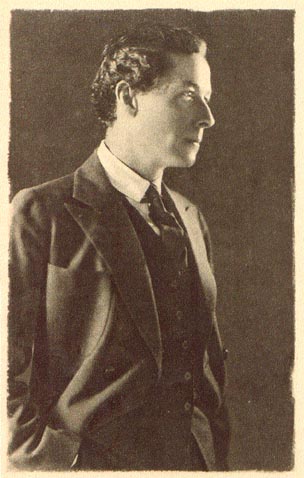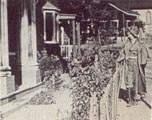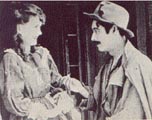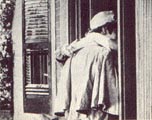Henry B. Walthall: Biography--Sweet Home Alabama
A Tribute Page to the Silent Film Star
Who was Henry B. Walthall?
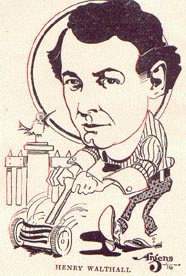
"Penograph" from a 1917 issue of
Motion Picture Magazine.
Note: I spent a lot of time
and care writing this biography and tried to reference every source
I used so, if any visitor finds a use for any
of the information here or on the other pages of this
site, please note this source. Thank you, M.W.
One hesitates to begin a biography of Henry
B. Walthall with a description of his famous role in the
1915 film The Birth of a Nation.
Nearly every article found on Walthall introduces the
actor as the "Little Colonel"--hero of the D.W. Griffith
masterpiece. Walthall once remarked in
a 1929 interview, "I've been trying to live down that
picture ever since it was made," and continuing, "It's beautiful, but I'm
sick of it" (Hayden). Silent film historian Anthony
Slide began Walthall's biographical entry with the
statement, "There is no other player from the silent era
so closely associated with one screen role than Henry B. Walthall"
(Slide II, pg. 401).
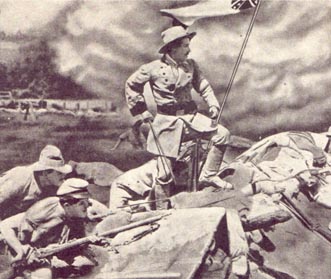
"Charge!!!" Col. Ben Cameron leading an attack on the Union Army.
As much as Walthall did not want to be identified as
one character in a 27-year acting career, his role as
Colonel Ben Cameron assured his place in film history.
D.W. Griffith, the Kentucky-born director, had an ambition to produce
and direct the greatest motion picture ever made around
Thomas Dixon's novel and play The Clansman; a history
of the Civil War and Reconstruction told from the South's
point of view. Griffith chose for his leading man another southerner,
Henry B. Walthall. In the film, Ben Cameron, with the dark,
curly hair and bushy mustache, leads the Confederate
troops in a vicious battle against the Union forces,
eventually to be wounded and pulled into the Union trench by
his northern friend. Providing one of the most memorable
scenes in motion picture history, Cameron returns to
his war-torn home to be greeted by his sister, who has
sewn cotton onto her dress in the hopes of uplifting
his southern spirits, and the outstretched arms of his mother.
In the Reconstruction part of the epic, a furious
Cameron, frustrated by the corruption caused by
northern politicians and freed slaves, founds the
Ku Klux Klan to, as President Woodrow Wilson (another southerner) is quoted
in the film's subtitles, "protect the Southern Country."
Although the Klan was seen more as a patriotic cause rather than as the racist
and terrorist organization it is seen as today, the film
was still emotionally explosive and politically
inflammatory upon its release. According to the
American Movie Classics 1999 documentary "Censored," The
Birth of a Nation has been "banned more than any other film
in motion picture history. Its right to be seen has been
challenged in over 100 cases, one as recently as 1980."
Due to the controversy surrounding the film, not to mention
the brilliant fighting scenes and the subtle yet
emotionally manipulative acting, Walthall's most
memorable role is almost certain to remain in print
for decades (and maybe centuries) to come. It is #44
on the American Film Institute's 100 Films of the Century
(the oldest picture on the list and one of only two silent
films). Film historical societies, festivals, not to mention college
courses in film and history (the latter of which
introduced this writer to The Birth of a Nation
and to Henry B. Walthall) will no doubt keep showing
Walthall in the prime of his career to future generations
who probably would never have seen or have heard of him otherwise.
Sweet Home Alabama
Henry Brazeale Walthall was born on March 16, 1878 on a
plantation near Shelby County, Alabama, sharing with
D.W. Griffith a chivalric southern culture and tradition
but enjoying perhaps a more affluent family life
than the director (Slide II, pg. 401). He was one of eight
Walthall children. Henry's father, Junius
Leigh Walthall, was a Virginia native who served as
captain in the Confederate Army and, later, became
a highly respected figure in Alabama politics (Williamson,
pp. 83-84). His middle name, Brazeale, was passed on
from his grandmother Eliza's Irish maiden name.
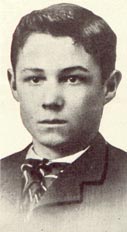
Young Henry. From the article
"The Early Days of
Henry B. Walthall,"
Picture-Play Magazine
August 1916, pg. 86.
Although the Walthalls hoped to make a scientific
farmer or lawyer out of their intelligent son, as
childhood chum Edwin Williamson recounts, "the boy's
talents were of a different nature." Henry was often found under
a shade tree reading the works of Poe when he was
supposed to be looking after the farmhands or, on
one occasion when ten years old, staging a
Wild West show in the pigpen (pp. 84-85). Walthall
developed an early fondness for entertaining, reciting
poetry his mother taught him and, later, playing the mandolin with a
group of musicians as they serenaded the young ladies (pp. 83, 87).
The handsome young Henry definitely had his share of
female admirers. As a schoolboy, he once carved in
his desk the initials "H.B.W.--A.T.G." His schoolmates
were curious as to who this sweetheart with the initials
A.T.G. could be. Finally, Henry admitted that "A.T.G."
stood for "all the girls" (pg. 89).
Henry's last surviving
brother Wales recounted his famous sibling's local
success in theatre: "Henry produced The Merchant
of Venice with homespun talent. We did the trial scene and I
had a small part as the friend of the Merchant.
Henry, of course, played Shylock...We played schoolhouses in Shelby
[Alabama] and other country towns to capacity business.
Our patron were the elite, and some of them had seen Edwin
Booth as Shylock. After several weeks' travel by wagon
and buggy we closed with a profit" (Griggs, pg. 122).
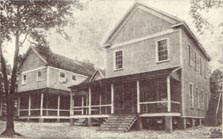
The schoolhouse in Selma, Alabama where Henry
packed them in.
From the article "The Early Days of
Henry B. Walthall,"
Picture-Play Magazine
August 1916, pg. 85.
Although Henry Walthall was not fated to live the plantation life,
he seemed to have fond memories of his childhood in
Alabama. Besides entertaining, he enjoyed swimming,
fishing,
hunting and was an excellent horseman (a talent
that would come in handy in his film career). His prowess
as a marksman is well-documented, and duck hunting
remained a favorite hobby. One story describes a young Henry
slaying a rare wild goose and with much pride
promising the neighbors a feast on the big, fat bird
for the next day only discovering that his mother
had sent the goose to the wife of the local
clergyman. Thereafter, Henry developed a dislike
for ministers (ironically, Walthall would play the role of
many a minister in his motion picture career) (McGaffey,
pg. 102). This episode certainly did not discourage his
love for his southern roots. In one interview, Walthall remarked that he
hoped to return to the place of his childhood once
he retired (Willis, pg. 55).
At twenty,
Walthall enlisted in the First Alabama Regiment with
the United States Army at the beginning of the Spanish-American
War. Serving eleven months, a bout of malarial fever
while in camp at Jacksonville, Florida kept Walthall
from the battlefields (Katchmer). To please his
parents, he tried his hand at law school at Howard
College but, finding it distasteful, dropped out
after six months. It was now time for the future
"Little Colonel" to leave home to pursue a career in
the theatre.
New York, New York
To make it in theatre,
New York was where Henry B. Walthall had to go. Armed
with money borrowed from a neighbor and character
references from Alabama governor Joseph F. Johnston and U.S. Senator
John Tyler Morgan, Walthall set out to find his calling (Katchmer).
He made his New York stage debut in 1901 and was cast in
popular southern melodramas (Slide II, pg. 401).
Although he progressed in the acting field, things
went slowly for the future "Edwin Booth of the Screen."
In a 1916 interview, Walthall described his early
days in theatre: "I went from Alabama to New York and
descended on the city with my hopes and nothing else.
New York, like every city, is unkindly to him she
doesn't know. And she was characteristic in her
treatment of me. I was out of a job and almost out
of hope. I found a job as a super in a theatrical
company doing small things for small towns. From then on
my life went back to stereotype. I was an actor working
up, and working up isn't an interesting thing to
anybody but the one who is working" (Ames, pg. 138).
But work did get interesting for Walthall. He joined
the theatrical company of Henry Miller and Margaret
Anglin which provided several seasons of steady employment (Franklin,
pg. 240). As part of the cast in The Great Divide,
Walthall met fellow cast member James Kirkwood.
This friendship soon introduced Walthall to a new
medium in which to showcase his talents.
Click here to continue
the biography with "The D.W. Griffith Years."
Please see the Bibliography
pages for details on the references used in this biography.

Free Hit Counter
